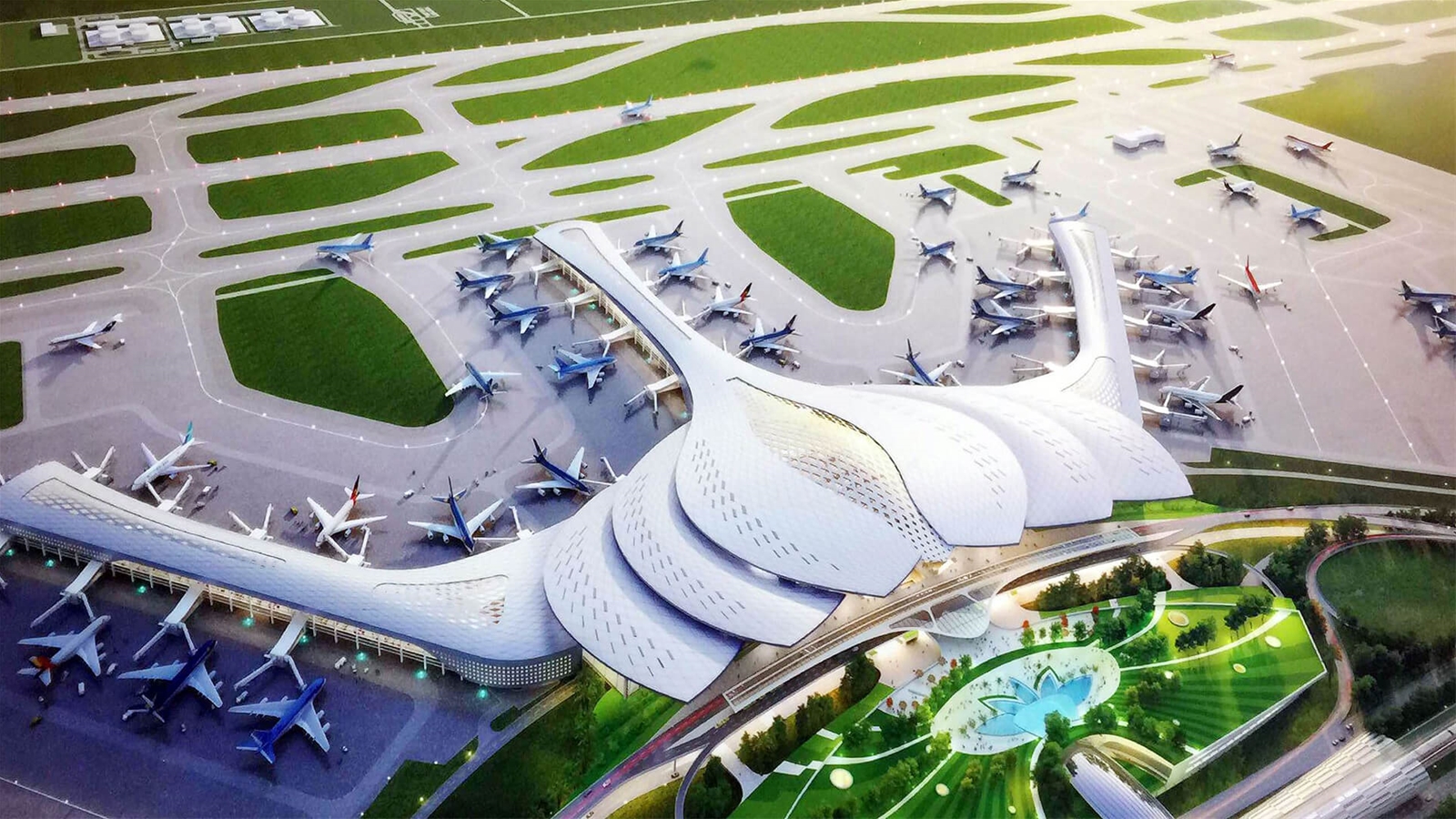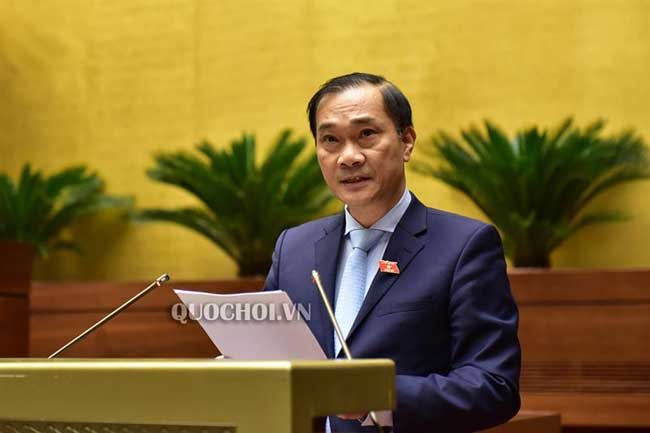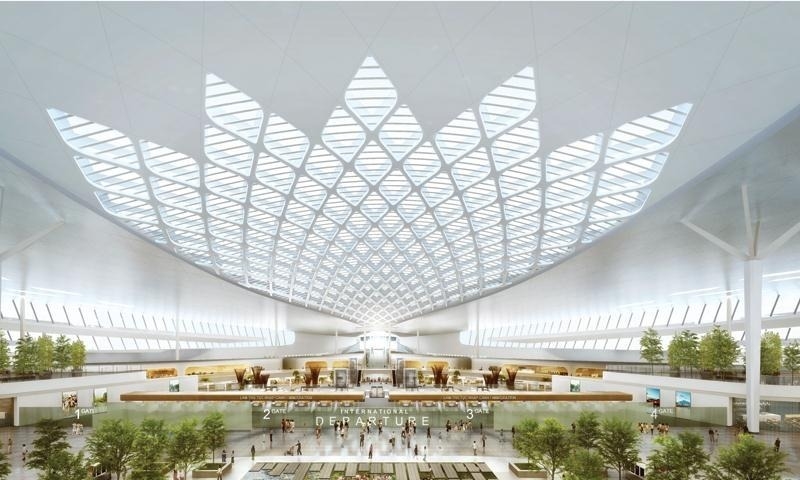
The government has proposed that the Airports Corporation of Vietnam (ACV) be the main investor of Long Thanh International Airport’s first phase, including a runway, taxiways, a terminal, aircraft parking space and other essential infrastructure.
At a group discussion on October 24, as part of the NA’s ongoing eighth sitting, Vu Hong Thanh, head of the NA’s Economic Committee, noted that the Government has yet to assess the impact of official development assistance loans for the project on the country’s public debt
Under the Law on Public Debt Management, the project is under the guarantee of the Government, so the $2.63 billion loan that ACV is set to borrow of the $4.2 billion it plans to invest in the project, may have to seek will be taken into account in the country’s public debt strategy.
Therefore, he asked the Government to clarify its ability to provide a guarantee for ACV’s loans.
In addition, the State currently holds 95% of ACV’s charter capital, so it must bear responsibility for risks to the State capital at the firm.
If the Government does not provide a guarantee for ACV’s loans, other agencies must tightly control ACV’s borrowing and use of loans.
However, the committee still gave the nod to the Government’s plan on the first phase but asked that the Government quickly formulate the second and third phases of the projects.
Moreover, ACV had earlier been selected as the main investor for the expansion of Tan Son Nhat International Airport and other airports. Therefore, its capacity to mobilize capital for all these projects has also raised concern, Thanh remarked.
The Government has completed the preliminary design for parts of the airport project. Once the detailed designs are created, the investment required may increase.
Therefore, the Government should make accurate calculations of the required capital for the projects.
For construction components that are meant for air navigation management, the Government plans to assign the State-owned Vietnam Air Traffic Management Corporation (VATM) to be the investor since this is the only company that is allowed to provide air navigation management services.
If ACV and VATM are chosen as the investors for the Long Thanh international airport project, the Government must consult with the Commission for the Management of State Capital at Enterprises on the use of State capital at these two firms.

According to the NA’s Economic Committee, the NA has no jurisdiction to appoint investors for projects. Under the Bidding Law, investor selection falls within the prime minister’s jurisdiction.
However, the project has national importance and is related to the country’s security and national defense, so the investors must be selected carefully and in line with the law.
Minister of Transport Nguyen Van The, on behalf of the Prime Minister, made the statement on October 24 as he presented the report on the feasibility study for the airport’s first phase. The study will be reviewed by the National Assembly (NA) during the ongoing 8th session of the 14th tenure held in Hanoi.
The planned airport, situated near its namesake township in the southern province of Dong Nai, is a national key project and expected to become a major international aviation hub in the region when it becomes operational, The said.
The first phase of the project costs an estimated 111.689 trillion VND or about 4.779 billion USD, a little lower than the previously NA-approved figure of 4.782 billion USD, with ground clearance costs not yet accounted for.
The Government proposed that ACV invest in the headquarters of management agencies at the airport, essential components for the airport and service items, worth some US$4.6 billion. Meanwhile, flight control facilities, which need US$147.9 million, should be assigned to VATM.
According to Minister The, VATM is the only firm to be allowed to provide flight control and operation services in Vietnam. Even if the project is opened up to domestic bids, only ACV will be selected as it has the experience of managing 21 airports in the country, The added.
“Carrying open bidding and weighing which investors to choose will certainly cost us another 1.5-2 years, while truth be told, there couldn’t possibly be any company other than ACV who has the experience, the capacity, and can satisfy the demands for the insurance of national security in a highly important project like Long Thanh International Airport,” The told the parliament.
If the National Assembly supports the government’s proposal, construction will start as scheduled so it could take the overflow from the overloaded Tan Son Nhat Airport, whose expansion is being delayed, he added.
As for ACV’s financial capacity, the corporation currently has VND25 trillion deposited at banks and VND10 trillion in annual revenue. It will have some VND75 trillion by 2025.
ACV has been working with foreign investment funds and they are willing to fund the project at preferential interest rates and do not need a government guarantee, he said. "The investors see that investing in Long Thanh Airport is sustainable. In reality, pouring money into big airports is never a losing proposition."
Since Long Thanh is a major international airport, the main investor needs to have experience in managing airports and the ability to ensure national security, and the airport must be built with public funding or domestic private funding, he said.
The Government also proposed the NA allow an increase in the first-phase construction area from 1,165 hectares to 1,810 hectares to add more items such as cargo storage and a cargo terminal and to accommodate a future second runway, as well as for the development of two roads leading to the airport.
If the two road projects are separated from the airport project, they will not be executed until 2021. If they are assigned to ACV, the firm will allocate VND4.8 trillion to build the roads.
Government Chief Inspector Le Minh Khai said that should ACV be tasked with building this project, a foreign firm should be hired to supervise it in the interests of ensuring transparency.

The NA approved the Long Thanh International Airport project in 2015. Two years later, it allowed the separation of compensation, site clearance and resettlement costs from the airport project’s overall costs.
The Dong Nai government was assigned to take charge of the compensation, site clearance and resettlement aspect, while the Government will be responsible for the development of a terminal and other items.
The airport, when in place, is expected to handle 100 million passengers and five million tons of cargo per year.
The project is divided into three phases. In phase one, which is scheduled for completion in 2025, a runway and a passenger terminal along with other auxiliary facilities will be developed, with a capacity of 25 million passengers and 1.2 million tons of cargo per year.
Total costs of three phases are estimated at VND336.63 trillion ($14.5 billion).


















